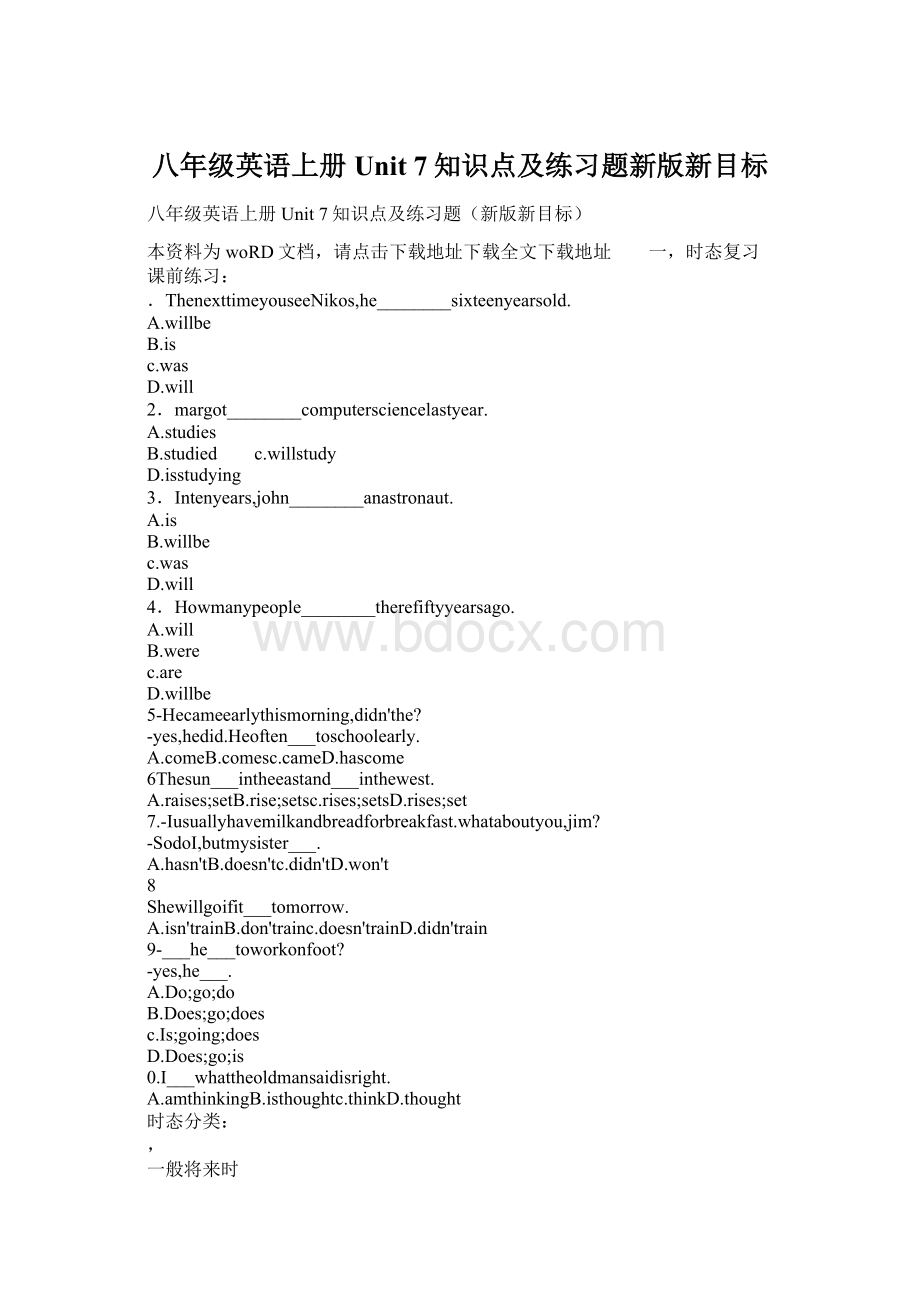八年级英语上册Unit 7知识点及练习题新版新目标文档格式.docx
《八年级英语上册Unit 7知识点及练习题新版新目标文档格式.docx》由会员分享,可在线阅读,更多相关《八年级英语上册Unit 7知识点及练习题新版新目标文档格式.docx(16页珍藏版)》请在冰豆网上搜索。

trainD.didn'
train
9-___he___toworkonfoot?
-yes,he___.
A.Do;
go;
do
B.Does;
does
c.Is;
going;
D.Does;
is
0.I___whattheoldmansaidisright.
A.amthinkingB.isthoughtc.thinkD.thought
时态分类:
,
一般将来时
常与tomorrow,next引导的短语(如nextweek),this引导的短语(如thisyear),fromnowon;
inthefuture,in+一段时间等连用。
形式:
(1)will/Shall+动词原形
(2)begoingto+动词原形
注:
“will”句型与“begoingto”句型区别。
前者表示纯粹将来,后者表示打算、计划、准备做的事情,更强调主语的主观意愿。
如:
TomorrowwillbeSaturday.明天是周六了。
wearegoingtovisitParisthissummer.今年夏天我们打算游览巴黎。
难点:
(3)用现在进行时表示。
表示位置转移的动词(如:
go,come,leave,start,come,go,arrive,reach等),可用现在进行时态表示按计划安排即将发生的动作。
Unclewangiscoming.王叔叔就要来了。
They’releavingforBeijing.他们即将前往北京。
I'
mleavingforBeijing.我要去北京。
anyclassesnextweek.
4.
There__________ameetingtomorrowafternoon.
A.willbegoingto
B.willgoingtobe
c.isgoingtobe
D.willgotobe
5.
–_____you______freetomorrow?
–No.I_____freethedayaftertomorrow.
A.Are;
goingto;
will
B.Are;
goingtobe;
c.Are;
willbe
D.Are;
6.–Let’sgoouttoplayfootball,shallwe?
–ok.I________.
A.willcoming
B.begoingtocome
e
D.amcoming
7.
________aconcertnextSaturday?
A.Therewillbe
B.willtherebe
c.Therecanbe
D.Thereare
8.Ifit________tomorrow,we’llgoroller-skating.
A.isn’train
B.won’train
c.doesn’train
D.doesn’tfine
9.–willhisparentsgotoseetheTerracottawarriorstomorrow?
–No,________.
A.theywilln’t.
B.theywon’t.
c.theyaren’t.
D.theydon’t.
0.—whereismisswang?
—ShewenttoHainanIslandlastweekandwillreturn___sixdays.
A.
agoB.laterc.behindD.in
1.Thetrain________at11.
A.goingtoarrive
B.willbearrive
c.isgoingto
D.isarriving
2.He________thereattentomorrowmorning.
c.willbe
D.be
3.________openthewindow?
A.willyouplease
B.Pleasewillyou
c.youplease
D.Doyou
2,
一般现在时
常与often,usually,sometimes,always,everyday等表示经常性的或习惯性的时间状语连用.
(频率副词)
3,
一般过去时(常与yesterday…,last…,…ago,in1990等表示过去状态的时间状语连用)
练习
.Howoften_____yourfather_____wine?
2.Hismother_____toseehimonceaweek.
3.Hersister_____athomeonSundays.
4.where_____youlastnight?
5.Sheexerciseseveryday.
___________________she________?
6.jimalwaysdoeshishomeworkafterschool.
jim____________hishomeworkafterschool.
7.Henevergoesfishing,___________?
8.He(go)______totheparkeveryday.
9.______LucyandLily(like)______china?
0.LiLei(notlike)______todrinkorangesoda.
1.______Liming’sfather(have)______hislunchathome?
2.Everybody(have)______achancetowin.
3.what_______you_______atthestore?
Iboughtacamera.
4.wereyouathomeyesterday?
yes,I_______.
5.wheredidyoucatchthefish?
I_______itintherivernearmyhouse.
6.whenI______(knock)athisdoor,hewascooking.
7.TomandI______(am,are,was,were)lateforschoolyesterday.
4,现在进行时
现在进行时由“am/is/are+动词现在分词”构成。
可以和now,atpresent,atthemoment等时间状语连用。
有时用一个动词,如look(看),listen(听)。
5,过去进行时
was/were+doingafriendwhenBob__________in
2.Itwasquitelateatnight.George__________andAmy__________herneedlewhenthey__________aknockatthedoor.
3.Thestudents______and____happilyontheplaygroundatthattime.
4.I_____you____formehere.
5.She_____herdressthewholeafternoon.
6.Inaletter,johntoldusthathe_____tochinanextmonth.
7.-_____they____ameetingat4yesterdayafternoon?
-No,they_____.They_____theclassroom.
8.
Hesaidhe_____todrawaplaneontheblackboardatthattime.
a.tries
b.tried
c.wastrying
d.willtry
9.whileshe______TV,she______asoundoutsidetheroom.
a.waswatching,washearing
b.watched,washearing
c.watched,heard
d.waswatching,heard
0.
we____forTomattenlastSunday.Heoftenkeptus______.
a.werewaiting,waiting
b.werewaiting,wait
c.waited,waiting
d.waited,wait
时态综合练习题
1How____itinEnglish?
A.yousayB.doyousayc.tospeakD.abouttalk
2
_____you___howtogetthebusstop?
A.Have;
knowB.Do;
knowc.Are;
knowing'
D./;
know
3.Thetrain___atfivethisafternoon.
A.leaveB.leavingc.leavesD.areleaving
4.ThetrainfromTianjin___anhourago.
A.arrivedB.hasarrivedc.wasarrivingD.arrivedat
5.Helivedtherebeforehe___tochina.
A.comeB.comesc.cameD.coming
6.Agirl___thewalletand___.
A.found;
turnsitinB.wouldfind;
hasturnedinit
c.found;
turneditinD.hasfound;
turnedinit
7.I___theblackboardbut___nothingonit.
A.lookedat;
sawB.havelooked;
saw
c.saw;
lookedatD.waslookingat;
wasseeing
8.when___tolearnEnglish?
A.doesshebeginB.didshebeginc.hasshebegunD.shebegan
9.myyoungerbrother____thearmy____1990.
A.joined;
atB.joined;
inc.hasjoined;
inD.hasjoined;
since
10.ThestudentshardlystudiedtheEnglishlanguage,___they?
A.didB.didn'
tc.wereD.weren'
11.Hecamein,___hiscoatandsatdown.
A.tookdownB.tookoffc.takingdownD.takingoff
12.whenhewasachild,he____inthegardeninthemorning.
A.alwaysplaysB.alwaysplayedc.playsalwaysD.playedalways
13.Heisgoodatmathsandhe___hard.
A.alwaysstudyB.alwaysisstudyingc.isalwaysstudyingD.studiesalways
14.oh,youarehere?
Ithinkyou____ontheplayground.
A.ranB.runsc.arerunningD.run
15.Look!
Anelephant___thisway.
A.wascomingB.iscomingc.cameD.comes
16.Bequiet!
I'
mtryingtohearwhattheman______.
A.issayingB.hassaidc.willsayD.says
17.whichcar___he___whentheaccidenthappened?
A.is;
repairingB.was;
repairingc.did;
repairD.does;
repair
18.I___goingtoLondonnextmonth.
A.willthinkofB.amthinkingofc.thinkofD.amthoughtof
19.we___forShanghaitonight.
A.arestartingB.havestartedc.startedD.start
20.-whosingsbestinyourclass?
-mary____.
A.isB.willc.doesD.do
21Thescientist___awalkinhisgardenatfourlastSunday.
A.wastakingB.wouldtakec.tookD.wastaken
22.weheardacrywhenwe___TVlastnight.
A.werewatchingB.wouldwatchc.watchD.watched
23.There___twoEnglishfilmsnextweek.
A.isgoingtobeB.aregoingtohavec.willhaveD.aregoingtobe
24.Thereisgoingto___avolleyballmatchonourschoolplayground.Thematchisgoingto___atsixthisevening.
A.have;
beB.be;
havec.be;
beD.have;
have
25Tellmewho_,__toourpartytomorrow.
A.iscomingBeD.havecome
26
-Isthisthelastexamforthisterm?
-yes,butthere___anothertestthreemonthsfromnow.
A.isB.wasc.willbeD.hasbeen
27-____I____thewindow?
-yes,please.
A.will;
cleanB.Am;
cleaningc.Do;
cleanD.Shall;
clean
Unit7willpeoplehaverobots?
考点1
Doyouthinktherewillberobotsinpeople'
shomes?
.Doyouthink...?
结构通常用来征求对方的意见或看法,后面接宾语从句,从句用陈述语序。
本句的肯定回答用"
yes,therewill."
,否定回答用"
No,therewon'
t."
。
---Doyouthinktherewillberobotsinschool?
你认为学校将来会有机器人吗?
---yes,therewill.是的,会有。
拓展:
doyouthink还可以用作插入语,在特殊疑问句中放在特殊疑问词之后,疑问句其他部分用陈述语序。
wheredoyouthinkhecomesfrom?
你认为他是哪里人?
EX:
1.---DoyouthinkTinawillgotoHongkong?
---
.
A.yes,shedoes.
B.No,Idon'
t.
c.yes,shewill.
D.No,shedoesn'
2.---DoyouthinktherewillbeafootballmatchonTVtonight.
A.yes,Ido.
B.No,Iwill.
c.yes,therewon'
D.No,therewon'
3.There
asportsmeetinginourschoolnextmonday.
A.willhave
B.isgoingtohave
D.aregoingtobe
4.---Dale,there
adictionaryandsomebooksonyourdesk.Pleaseputthemaway.
---ok,mum.I'
lldoitrightaway.
B.are
c.has
D.have
考点2willpeopleusemoneyin100years?
一百年后人们还会用钱吗?
辨析:
in,after与later
In和after都可以表示"
在...之后"
,但用法有所不同。
In是指以现在时间为起点的"
在一段时间以后"
,也可以表示"
在将来多少时间之内"
,句中的谓语动词要用一般将来时态。
Hewillbebackintwodays.他将在两天后回来。
After常常指以过去时间为起点的"
在一段时间之后"
,所以它常与过去时态连用。
当after指某个特定的未来时刻或日期之后或指以将来某一时间为起点的若干时间之后时,它可以与将来时态连用。
HestartedonSundayandarrivedinBeijingafterthreedays.他星期天动身,3天后到达北京。
llbefreeafterFriday.我星期五之后有空。
Hewillbebackafterthreeo'
clock.他3点之后回来。
Later是副词,表示"
一段时间之后"
,构成"
一段时间+later"
短语,用于过去时;
如果单独使用,可与将来时或过去时连用。
Ninemonthslatertheywerediscovered.九个月之后,他们被发现了。
选词填空
.mymotherhasgonetoHongkong,shewillbeback
aweek.
2.Hewenttohishometown
threeyears.
3.---Howsoonwilltheplanetakeoff?
aboutfiveminutes.
4.---Theywillmeetusintwohours.
---That'
stosay,
threeo'
clock?
5.HisfatherwenttoBeijingaweekago.Twodays
,hewenttoTianjin.
6.
0n,Irealizedthatitdoesn'
tmatterifyoudon'
tunderstandeveryword.
考点3
Therewillbelessfreetime.将会有更少的闲暇时间。
Therewillbefewerpeople.将会有更少的人。
Therewillbemorepollution.将会有更多的污染。
.辨析:
fewer与less
Fewer与less分别为few和little的
,都意为"
"
Fewer与
复数形式连用,其反义词为many的比较级more。
less与
名词连用,其反义词为much的比较级more。
Theybuyfewercigarettesandlessbeernow.现在他们买的香烟和啤酒少些了。
less也可作副词,意为"
较少地,更少地"
,常用来修饰形容词、副词或动词。
其反义词为more,用法与less相同。
Eatless,drinklessandsleepmore.少吃,少喝,多睡觉。
.Thedoctortoldjennytoeat
vegetablesand
meatbecauseshewasgettingheavierandheavier.
A.much,little
B.more,less
c.many,few
D.more,fewer
2.manyoldpeoplegetsickbecauseofseriousair
3.wastewaterfromchemicalfactoriesmaybe
thesea.
考点4
spacestation太空站
Space不可数名词,意为"
太空,空间"
,一般情况下不与冠词连用,但如果space前面有表示太空情况的形容词(如dark,cold,airless)修饰,则可与定冠词连用。
Theearthtravelsaroundthesuninspace.地球在太空中围绕太阳旋转。
space,room与place
Space作"
太空"
讲时,是不可数名词;
作"
空间,空地"
讲时,可与room互换。
Room作"
房间"
讲时是可数名词;
空间,地方"
讲时是不可数名词,指可以容纳东西或其他目的而可占据、使用的空间。
makeroomfor...为...腾出空间
Place指某一具体"
地点,地方"
,是可数名词。
1.---Thereisnotenough
forusinthelift.